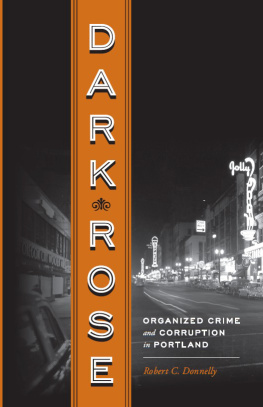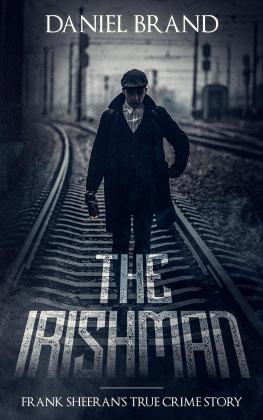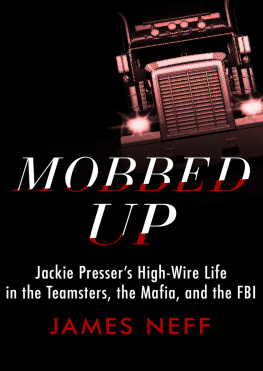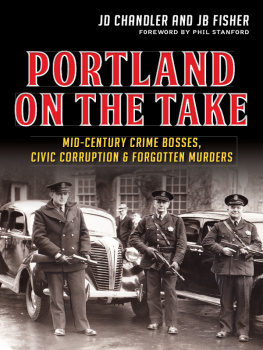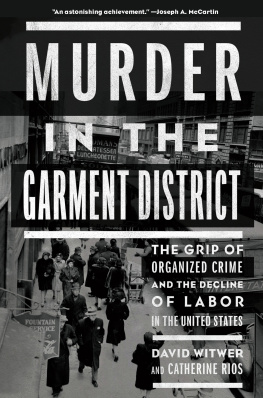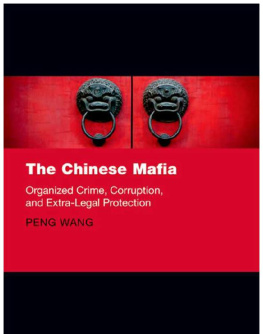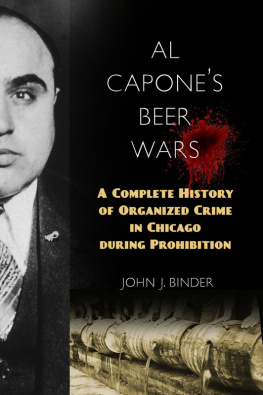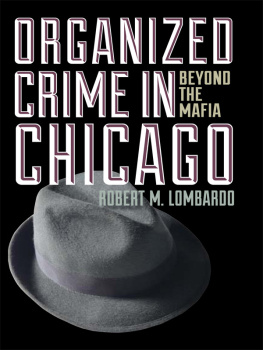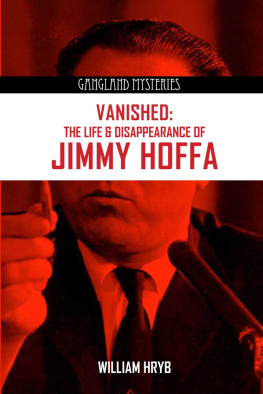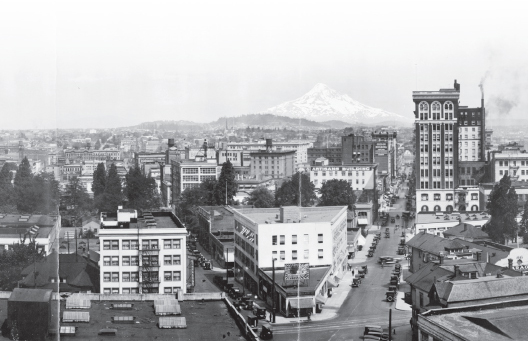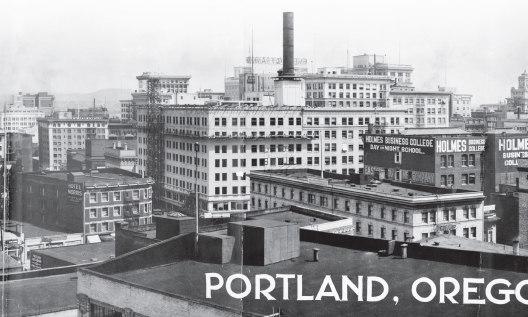All rights reserved. No part of this publication may be reproduced or transmitted in any form or by any means, electronic or mechanical, including photocopy, recording, or any information storage or retrieval system, without permission in writing from the publisher.
Donnelly, Robert C.
Dark rose : organized crime and corruption in Portland / Robert C. Donnelly.
p. cm.
Includes bibliographical references and index.
ISBN 978-0-295-99111-5 (pbk. : alk. paper)
1. Organized crimeOregonPortlandHistory. 2. CorruptionOregonPortlandHistory. 3. Portland (Or.)History.
I. Title.
The paper used in this publication is acid-free and 90 percent recycled from at least 50 percent post-consumer waste. It meets the minimum requirements of American National Standard for Information SciencesPermanence of Paper for Printed Library Materials, ANSI Z39.481984.
Portland, Oregon. Acme Commercial Photographers, 1923. Library of Congress Prints and Photographs Division, US GEOG Oregon no. 42 (SOS).
FOREWORD
Portland Has Not Always Been Portland
SURE, THE NAME'S BEEN THE SAME SINCE 1845, BUT THE twenty-first century city represents a radical break from the majority of its history.
Portland today has a worldwide reputation as a capital of good planning, a place where concerned citizens work together to craft a city that not only works in the present but has the potential to survive the environmental challenges of the coming decades. It is the only city in the United States with a directly elected regional government and the first large metropolitan area to utilize an urban growth boundary to contain sprawl. It is a leader in new rail transit and bicycle commuting. It has built a vibrant downtown, recycled older neighborhoods, and enhanced natural areas within the city. It strikes many visitors as one of the most European of American citiesdefinitely a compliment when the visitor is from Europe.
Read a little history, however, and a very different city emerges. Portland in its first century was a frontier settlement, then a workingman's town, and then a rough-and-ready city with close ties to the farms and forests whose bounty stoked the economy. Businessmen ran the city in the interests of economic growth and real estate profits. Intellectuals couldn't wait to get outpeople like John Reed at the start of the twentieth century and Gary Snyder at mid-century.
Portland's skid road was one of the largest in the country. Stretching for twenty-five blocks along the downtown waterfront was a district of cheap hotels, saloons, missions, flophouses, labor exchanges, and second-hand stores that served the needs of single male workers. Men, whose chief asset was their muscles, worked half the year repairing railroads, tending and harvesting crops, cutting and milling trees, crewing sailing ships, and building the cities and towns of the Pacific Northwest. In the off season they gravitated to the Portland waterfront to winter over, spending their money on food, drink, cards, and women. Immigrants from Italy, China, Greece, and Japan mixed with the native born. Those who could vote supported the Republican Party's political machine in the standard style of corrupt boss politics.
To be sure, there were efforts at both respectability and reform (they weren't exactly the same thing). Members of the elite cultivated eastern manners and connections. They sent their children to Ivy League schools and erected offices and homes and civic buildings in proper Romanesque and Georgian revival styles. They staged a successful world's fair in 1905 to show off the city to visitors and laid the foundations of museums and parks. At the same time, members of the middle class could separate themselves from skid road and downtown vice by moving to new streetcar suburbs on the east side of the Willamette River. These were the folks who supported Progressive reforms that included the adoption of the Commission form of government in 1913.
As Robert Donnelly shows, however, reform efforts did not crack the tight alliance among vice industries, politicians, police, and real estate owners. The Portland Vice Commission report of 1912 revealed the pervasiveness of gambling and prostitution in downtown Portland and embarrassed the powerful, but it made only a temporary dent in the problem of corruption. The city passed through the 1920s with murder and scandal over water-front land development and the 1930s with labor strife that included an accidental potshot at Franklin Roosevelt's personal emissary.
The 1940s were even tenser, as 150,000 new residents crowded the city to build ships for the Allied war effort. Some of the workers brought their families, but many did not. Unattached young men needed outlets for their energy and their money. Movie theaters ran around the clock and brothels presumably did as wellpushed out of sight but not out of mind by government authorities. As Donnelly points out, the police regulated and contained vice rather than suppressing it. The mayor was notoriously on the take.
This is the context for Donnelly's story of the corruption scandals and Congressional investigations that rocked Portland in the 1950s. Vice industries were entrenched and law enforcement played along. Labor unions like the Teamsters were flush with members and led by men who saw opportunities to muscle in on profitable businesses. It took newspaper reporters and unwanted national publicity to show Portlanders what their city looked like to others.
What's striking about the history recounted in Dark Rose is that it marks the end of one Portland era and signals the beginning of another. The progressive Portland of today has its roots in the scandals of the 1950s, which discredited the old regime and put them on notice that there would be no more business as usual. Business and political leaders of the mid-1950s either adapted to change or saw their influence erode. The years from 1965 to 1975 would bring a veritable revolution to Portland politics, with new issues and new grassroots participants. Community activists made changes to the fabric of the city in ways that remade both downtown and neighborhoods and environmentalists, transportation advocates, and other new voices placed the city on a new trajectory of development that it is still following today.
Robert Donnelly has found a pivotal moment in Portland history. Nobody in the mid-1950s could have imagined the Portland of 2011, but their actions and inactions in those tumultuous years helped to clear the stage for the present-day city.
Carl Abbott
Portland State University
ACKNOWLEDGMENTS
I AM TRULY GRATEFUL FOR THE SUPPORT AND GUIDANCE FROM friends and family as I worked on Dark Rose. Like all great endeavors, I made a number of new friends while researching for this project, particularly Bob Larson, Arthur Kaplan, and Wally Turner. Wally and Arthur were both very generous with their time and provided valuable information and insight into a complicated period in Portland history. You will recognize Wally in the following pages; he was a great journalist and kindly shared with me his stories and life. Arthur had a long, distinguished legal career, highlighted by his work with Robert Kennedy and the McClellan Committee. Bob Larson thought of me and my research as he perused a neighborhood sale one weekend, and selflessly shared the small treasure he found. Portland writer Phil Stanford, while finishing his work on this topic, was also generous with his own insights, data, and time.

